|
De Poolse futuristische schrijver Bruno Jasieński (eig. Wiktor Zysman) werd geboren op 17 juli 1901 in Klimontov.Zie ook alle tags voor Bruno Jasieński op dit blog.
Uit:I Burn Paris (Vertaald door Soren A. Gauger & Marcin Piekoszewski)
“The following day was the 14th of July.
Paris's intrepid shopkeepers, those who had stormed the Bastille to erect in its place an ugly hollow column "with a view of the city," twelve bistros, and three brothels for average citizens and one for homosexuals, were throwing a party in their own honor, as they did every year, with a traditional, republican dance.
Decorated from head to toe in sashes of tricolor bows, Paris looked like an aging actress dressed up like a country bumpkin to star in some folksy piece of trash at the church fair.
The squares, illuminated with tens of thousands of paper lanterns and light bulbs, slowly filled with the strolling crowd.
With the coming of dusk an unseen switch was flicked, and the gaudy footlights of the streets exploded in a gala show.
On platforms cobbled together from planks, drowsy, grotesque musicians — rightly assuming that a holiday meant a day of communal rest — blew a few bars of a fashionable dance tune out of their strangely warped trumpets every half-hour or so, and then rested long and extravagantly.
The gathering crowd, stuffed into the cramped gullies of the streets, thrashed impatiently like fish about to spawn.
Dancing broke out in places. With no space to dance in, the entwined bodies were reduced to a sequence of ritual gestures, soon thereafter performed in the solitude of the only truly democratic institutions, the nearby hotels, which were not observing this holiday of universal equality.
Over it all rose the smell of sweat, wine, and face powder, the ineffable, translucent summertime fog exuded by the surging rivers of crowds.
The smoldering houses endlessly perspired dozens of new residents. The temperature rose with each passing minute. In the scorching frying pans of the squares the crowd started to bubble like boiling water around the improvised lemonade and menthe glacée booths. Chilled glasses filled with the greenish and white liquids were snatched from one hand by another.”
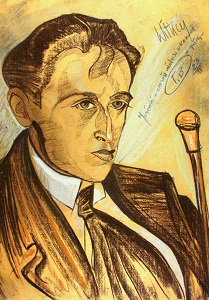
Bruno Jasieński (17 juli 1901 – 17 september 1938)
Getekend door Stanisław Witkiewicz, 1921
De Amerikaanse dichter, schrijver en vredesactivist Mattie Joseph Thaddeus Stepanek werd geboren in Washington D.C. op 17 juli 1990. Zie ook alle tags voor Mattie Stepanek op dit blog.
Heartsong
I have a song, deep in my heart,
and only I can hear it.
If I close my eyes and sit very still
it is so easy to listen to my song
When my eyes are open
and I am so busy and moving and
busy, if I take time and listen very hard, I can st
ill hear my
heartsong.
It makes me feel happy.
Happier than ever.
Happier than everywhere,
and everything and everyone in the world.
Happy like thinking about
Going to Heaven when I die.
My heartsong goes like this-
I love you! I love you!
How happy can you be!
How happy can you make this whole world be!
And sometimes it's other
Tunes and words, too.
But it always sings the same special song.
But do you know what?
All people have a special song inside their hearts!
Everyone in the whole world has a special heartsong
If you believe in magical, musical hearts.
And if you believe you can be happy
Then you, too, will hear your song.

Mattie Stepanek (17 juli 1990 – 22 juni 2004)
Hier in gesprek met Oprah Winfrey
De Zwitserse schrijver Jakob Christoph Heer werd geboren op 17 juli 1859 in Winterthur-Töss. Zie ook alle tags voor Jakob Christoph Heer op dit blog.
Uit:An heiligen Wassern
„Die Leitung heißt, das »helige Wasser« und befruchtet die sonnenglühenden Weingärten, die Aecker und Wiesen Hospels und der fünf Dörfer, die um den Flecken liegen.
Wenn man drei Stunden bergauf und ebenhin über schmale Mattenstreifen gegangen ist, kommt man zu der alten verwitterten Kapelle der Lieben Frau, wo der Weg auf einem vielhundertjährigen vermoosten Brückenbogen über die Schlucht nach dem Schmelzwerk St. Peter hinüberspringt.
Um die halb zerfallenen Gebäude des ehemaligen Bergwerkes dehnt sich des Teufels Garten.
Auf Hügeln alter verglaster Schlacken blüht der rote Mohn, die Königskerze reckt ihre goldigen Blütenschäfte, das Singrün spinnt seine blauen Blumenketten um die Scherben, allerlei blühender Wust und viele Brennesseln wuchern zwischen ihnen empor, stahlblaue Fliegen und Schmetterlinge gaukeln über die wilde Pracht.
An einem verkrüppelten Ahorn stand an jenem Nachmittage, wo Peter Waldisch, der Präsident von St. Peter, durchs Thal fuhr, eine Mauleselin angebunden. Sie schüttelte den Kopf, scharrte mit dem linken Vorderfuß und erhob trotz dem Schatten, den ihr die Ruine spendete, von Zeit zu Zeit ein klägliches Geschrei. Dann tauchte aus der wilden Ueppigkeit der bunt bekränzte Schwarzkopf eines Mädchens auf, das auf den bloßen braunen Armen ein übermächtiges Bündel von Blumen trug. »Ich komme. Galta, ich komme,« rief sie dem Tier begütigend zu, dann verschwand die ganze Gestalt wieder in den Wogen des Sommerwustes, bis sie so viel Blumen an die Brust drückte, als ihr Arm fassen konnte. Da watete sie endlich aus der Wirrnis. Ihr kurzes Röckchen schützte sie nur bis wenig unter die Kniee, aber gewandt wie ein Wiesel wich sie den vielen Brennesselbüschen aus, die ihre nackten Füße und Waden bedrohten. Eine lebendig gewordene Bronzefigur, Gesicht, Arme, Füße sonnengebräunt, war sie fast so wild wie die Wildnis, die sie durchschritt, im Kopf standen ein paar feurige Augen, wie die einer Zigeunerin; doch sah man dem Mädchen gleich an, daß es kein Bauernkind war, dafür war alles an ihr zu zart und zu fein.“
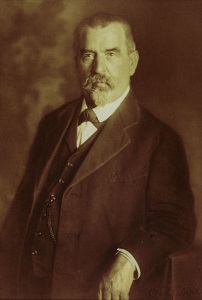
Jakob Christoph Heer (17 juli 1859 - 20. August 1925)
De Hebreeuwse schrijver Shmuel Yosef Agnon (eig. Shmuel Yosef Czaczkes) werd geboren in Buczacs, Galicië (nu in Oekraïne) op 17 juli 1888. Zie ook alle tags voor Shmuel Yosef Agnon op dit blog.
Uit:A Guest for the Night (Vertaald door Misha Louvish)
“On the eve of the Day of Atonement, in the afternoon, I changed from the express to the local train that runs to my home town. The Jews who had traveled with me got out and went their way, while Gentile townsfolk, men and women, made their way in. The wheels rolled sluggishly
between hills and mountains, valleys and gorges; at every station the train stopped and lingered, let out people and baggage, and started up again. After two hours, signs of Szibucz sprouted from both sides of the road. I put my hand to my heart. My hand throbbed against my heart, just as my heart throbbed under my hand. The townsfolk put out their pipes and shoved them into their leggings, got up to collect their baggage, and sat down again; the women elbowed their way to the window, crying ‘Rubberovitch,’ and laughed. The train whistled and puffed, whistled again, then sprawled to rest opposite the station.
Along came the dispatcher called ‘Rubberovitch’; his left arm had been lost in the war; the new one they gave him was made of rubber. He stood erect, waving the flag in his hand, and called: ‘Szibucz!’ It was many years since I had heard the name of Szibucz coming from the lips of a man of my town. Only he who is born there and bred there and lives there knows how to pronounce every single letter of that name. After Rubberovitch had got the name of Szibucz out of his mouth, he licked his mustache as if he had been munching sweetmeats, carefully scrutinized the passengers stepping down, stroked his rubber arm, and made ready to send off the train.
I picked up my two valises and walked to the back of the station yard, looking for a carriage to take me into town.“
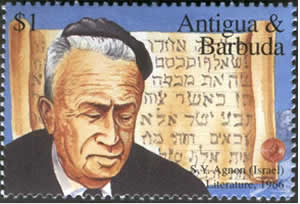
Shmuel Yosef Agnon (17 juli 1888 – 17 februari 1970)
De Australische schrijfster Christina Stead werd geboren in Rockdale, New South Wales op 17 juli 1902. Zie ook alle tags voor Christina Stead op dit blog.
Uit: Seven Poor Men of Sydney
“The hideous low scarred yellow horny and barren headland lies curled like a scorpion in a blinding sea and sky. At night, house-lamps and ships' lanterns burn with a rousing shine, and the headlights of cars swing over Fisherman's Bay. In the day, the traffic of the village crawls along the skyline, past the lighthouse and signal station, and drops by cleft and volcanic gully to the old village that has a bare footing on the edge of the bay. It was, and remains, a military and maritime settlement. When the gunners are in camp, searchlights sweep over the bay all night, lighting bedrooms and the china on dressers, discolouring the foliage and making seagulls fly; in the daytime, when the red signal is flown over the barracks, the plates and windows rattle with the report of guns at target practice. From the signal station messages come down of the movements of ships and storms. Flags flutter and red globes swing on its great mast, which is higher than the Catholic Church, higher than the Norfolk Island pines, higher than the lighthouse and than anything else which is between the rocky cornice and the sandy seafloor. In dark nights, from the base of that enormous spectral pole which points up any distance into the starry world, one looks down on the city and northern harbour settlements, on the pilot-lights in the eastern and western channels, and on the unseen dark sea, where the lighthouse ray is lost beyond the horizon and where ships appear through the waves, far out, lighted like a Christmas Tree, small, and disappearing momentarily; and where, after half an hour of increasing radiance, the yellow rim of the great sub-tropical moon comes up like a lantern from underneath.”
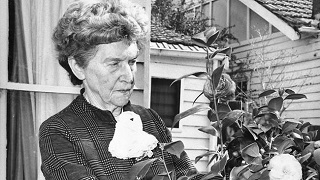
Christina Stead (17 juli 1902 – 31 maart 1983)
De Japanse schrijver Michio Takeyama werd geboren op 17 juli 1903 in Osaka. Zie ook alle tags voor Michio Takeyama op dit blog en ook ook mijn blog van 17 juli 2010.
Uit: Harp of Burma (Vertaald door H.Hibbert)
“I seemed to be walking on and on forever through a peaceful, languid garden of rice paddies. This was no longer the territory of savages, but of an ancient and high civilization. Here and there farmers were plowing their fields, using water buffaloes. As a buffalo started to move, snowy herons would fly down and perch on its back and horns. But they flew away again in fright whenever a buffalo reached the edge of the field the farmer turned his plow.
Once, as I was walking along, a moist wind began to blow and the sky quickly filled with black clouds. Herons were tossing in the wind like downy feathers. Soon the rain came. Rainfall in Burma is violent. Before I knew it, I was shut in by a thick spray. I could hardly breathe--I felt as if I were swimming.
After a while the rain stopped and the sky cleared. All at once the landscape brightened and a vast rainbow hung across the sky. The mist was gone, as if a curtain had been lifted. And there, under the rainbow, the farmers were singing and plowing again. ”
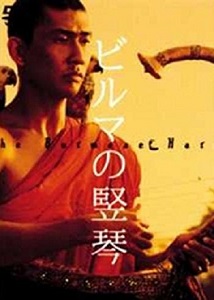
Michio Takeyama (17 juli 1903 – 15 juni 1984)
Affiche voor de film “The Burmese Harp” uit 1956
Onafhankelijk van geboortedata
De Duitse schrijfster Lilian Loke werd geboren in 1985 in München. Zie ook alle tags voor Lilian Loke op dit blog.
Uit: Gold in den Straßen
„Nur, falls er sich irrt, hat er demnächst eine Karteileiche mit deutlich zu hoher Marktwerteinschätzung im Portfolio, die er Falber und der Eigentümerin sehr schlecht wird erklären können. Noch gestern war Meyer überzeugt, Brink werde das Haus lieben, heute früh war er es nicht mehr. Heute früh wachte er auf, in Panik, eine Stunde quälte er sich durch die neblige Luft, begleitet vom Knirschen des Waldwegs unter den Schuhen. Gerade als er das Stauwehr am Weiher erreichte, hallte tief über dem Stadtwald das schrille Dröhnen eines Flugzeugs, Meyer sah auf, die Maschine so nah, dass er das Emblem der Lufthansa erkannte, das Blinken des Hecklichts. Er knickte um, verlor das Gleichgewicht, bekam nichts zu fassen außer den Ästen eines dürren Strauchs, dessen Wurzeln unter seinen Händen aus der Erde rissen, als er den vom Regen aufgeweichten Wegrand hinabschlitterte, bis über die steile Uferkante am Wehr.
Ob er einen Arzt brauche. Meyers Knöchel fühlt sich taub an, aber er kann auftreten. Nein, kein Arzt, er sei okay. Danke. Vielen Dank für die Hilfe. Scham macht ihm die Kehle eng, er friert erbärmlich, sein weißer Trainingsanzug ist verdreckt, Seeschlick, tote Blätter, Erde, aber Meyer zwingt sich zu einem Lächeln, – Gehen Sie ruhig, mein Auto steht gleich hinten auf dem Parkplatz, – doch der Mann winkt ab. Er bringe ihn, sein Wagen stehe auch da.
Passen Sie nächstes Mal auf mit ihrer Kreislaufgeschichte. Der Mann beugt sich zu Meyer in die offene Fahrertür, klopft zum Abschied auf das Autodach. Ob er sicher sei, dass er fahren könne. Meyer nickt. Ganz sicher. Seine Stimme bricht, er räuspert sich energisch, keine Minute länger erträgt er den mitleidigen Blick des Mannes, der Blick treibt ihm ein Brennen über das ganze Gesicht. Demonstrativ lässt er den Motor an, keine Sorge, es gehe ihm gut. Als er endlich alleine ist, dreht Meyer die Heizung bis zum Anschlag auf, stützt sich einen Moment auf dem Lenkrad ab, vergräbt den Kopf in den Armen. Er zittert immer noch, fühlt seinen Puls in den Schläfen, die Feuchtigkeit seiner Hose auf dem Ledersitz, aber kann sich nicht rühren. Erst als sein Telefon auf der Ablage vibriert, an den Termin mit Brink erinnert, reißt Meyer ein Handtuch aus der Sporttasche, wischt den Sitz ab, legt es sich unter.“
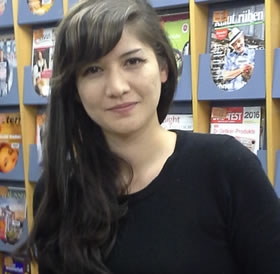
Lilian Loke (München, 1985)
17-07-2016 om 12:14
geschreven door Romenu 
Tags:Bruno Jasień,sk, Mattie Stepanek, Jakob Christoph Heer, Shmuel Yosef Agnon, Christina Stead, Michio Takeyama, Lilian Loke, Romenu
|

